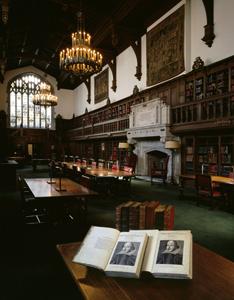Year of the Bard
By • April 8, 2016 0 1165

This is William Shakespeare’s year, and April is William Shakespeare’s month.
In April, we celebrate both the Bard’s birth and his death. There is no official birth date for Shakespeare, the world’s most celebrated playwright and writer, but he was baptized April 26, 1564, and he died April 23, 1616, at the age of 52.
All of which makes the Folger Shakespeare Library a great place to be this month. Throughout 2016, the venerable American institution of all things Shakespearean is celebrating 400 years of Shakespeare with exhibitions, performances and other special programming under the umbrella of “The Wonder of Will.”
The whole country will be able to see the touring exhibition “First Folio! The Book That Gave Us Shakespeare.” Copies of the 1623 book — of which the Folger owns 82 of the surviving 233 in the world — will tour all 50 states, Washington, D.C., and Puerto Rico, landing at 23 museums, 20 universities, five public libraries, three historical societies and a theater. At selected sites, a touring production of “The Gravedigger’s Tale” will also be seen.
At the Folger, on Capitol Hill just past the Supreme Court and the Library of Congress, the big birthday party will be Sunday, April 24, with face painting, wandering minstrels, clowns, jugglers, a cake and the presence of Queen Elizabeth (the first, not the second) herself.
The day before, Saturday, April 23, the Folger will host a day of international live streaming, in which actors, scholars, artists and community leaders will share their connections to Shakespeare.
On April 7, the Folger will open “America’s Shakespeare,” which will focus on how Shakespeare has become America’s Bard through letters, costumes, books, photographs and film. It closes July 24, to be followed by “Will & Jane: Shakespeare, Austen and the Cult of Celebrity,” beginning Aug. 6.
On April 8, 9 and 10, the Folger Consort will be performing “Shakespeare and Purcell: Music of The Fairy Queen and Other Works.”
The Folger gala will be Monday, April 18. A few days later, the wacky Reduced Shakespeare Company will return for the world premiere of “William Shakespeare’s Long Lost First Play (abridged),” running April 21 to May 8. In May, the Folger will wrap up its theater season with Aaron Posner’s “District Merchants,” a contemporary version of “The Merchant of Venice,” directed by Michael John Garcés.
“We still pay attention to Shakespeare because, no matter how networked our world becomes, he remains one of the ultimate connectors,” said Michael Witmore, director of the Folger. “In a sense, Shakespeare wrote the preamble to modern life.”
Shakespeare remains, is, was and will always be the most contemporary of authors. Directors, adapters and performers try to find ways to contemporize Shakespeare’s plays, sometimes successfully, sometimes not, although — forsooth and in truth — they don’t need it. I may be irritated to hear the word “prithee” time and again in the plays, because it sounds like a forced anachronism, but then again we may yet feel the same way about David Mamet’s four-letter explosions someday.
Some people still doubt that the Bard was the Bard. Personally, I have no doubt that William Shakespeare wrote the plays — for money, for esteem, for profit and prosperity and perhaps for posterity. Someone once said that a man who doesn’t know he’s a genius probably isn’t. I think Shakespeare may have guessed that he was special in his talent but probably didn’t think of himself as a genius. I think he thought of himself as a man of the theater, the modern version of which he practically invented.
The words certainly were the point of it all — the stories he purloined from ready-made sources — but there are musical, operatic, and vaudeville versions of Hamlet (not to mention a wordless one recently at the Washington Ballet).
Shakespeare to this day does what show business does: entertains us and makes us laugh, saddens us and makes us cry buckets and, most of all, without trying, makes us think of our own humanity. In his plays, we are not just at the theater, but on stage ourselves. In every play, there is something for someone: a pratfall, a joke, a fairy queen, a monster, a magician losing his magic, a king losing his kingdom, the outsider trying to find his way in an alien society and a parade of hypnotic, strong, beautiful female characters, which their swains and male contemporaries never quite understand.
That is the wonder of Will, just like today.

